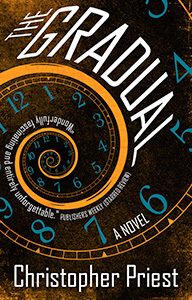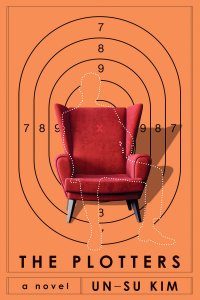Paul Di Filippo reviews David Shafer
I knew I was going to enjoy David Shafer’s debut novel—whose title conceals the familiar internet acronym WTF, a not-so-secret jape which the book’s clever cover design readily reveals—when on page five I encountered this: “Was it [the country] called Burma, which had something to do with Orwell? Or Myanmar, which sounded like a name cats would give their country?” Such irreverent cleverness, nailing down a hitherto unexpressed aperçu with precision, is precisely my cup of kopi luwak, and I was hooked.
Given Shafer’s other fine storytelling attributes already on display in the first few pages, I knew I was in for a helluva ride. Of course, advance publicity nominating the book as “Pynchonesque” made me favorably disposed, given my fondness for the works of Thomas Ruggles. But such praise is a double-edged sword. It’s a tall benchmark to measure up to, and any faltering can make the junior novel seem pale by comparison, when otherwise, without the burden of any prior linkage to an illustrious ancestor, it might still have seemed reasonably good. No worries here, however, as Shafer lives up to the billing.
There are three major protagonists in WTF, two sympathetic and one rather repellent. But it’s to Shafer’s credit that although the less likable guy gets deservedly less screen time, he still comes off as thoroughly explored and inhabited.
First we are introduced to Leila Majnoun, a facilitator/administrator/field operative for an NGO operating in Burma. Competent and caring, but a bit of a loner and also somewhat cynical, Leila happens to half-witness something illicit and sinister in Burma that throws her life right off the rails. The next thing she knows, she’s expelled from the country and her family back in the USA—parents and brother—are being seriously messed with. Flying to London, looking for answers on the strength of one enigmatic online contact, she is about to tumble into a world of plots and counterplots.
Our second viewpoint character is poor Leo Crane. Leo is, to put it mildly, not “neurotypical.” He has epiphanical moments of high-bandwidth information transmission which he calls “truth holes.” He self-medicates with alcohol and other drugs. He can be found on the roof of his house fighting imaginary opponents like Don Quixote. In short, he rather resembles Philip K. Dick during the pink light experience from VALIS. Leo has been putting his paranoid insights into blog form—which revelations might have something to do with him getting fired from his job as a daycare monitor and being committed to the Quivering Pines rehab facility.
Then there’s Mark Deveraux. A general wastrel and venal egomaniac with an even worse intoxicant-abuse record than Leo (the two men, once friends, now distant and uncommunicative, went to Harvard together), Mark parlayed a fluke into the big time. Stoned, he wrote a self-help, New Age-ish essay (incorporating a little plagiarism from Leo’s blog) that went viral and got turned into a best-selling book. But he’s blown through all his profits, and the sequel is due with no inspiration in sight. About the only thing keeping Mark afloat is his shallow friendship with James Straw. Straw is a zillionaire who runs SineCo, a company that maps, more or less, onto the Google we know. Straw keeps Mark around as his pet Yoda. But what Mark doesn’t realize is that Straw and his new Node device are part of a plan by the ultra-secret Committee to take over the world.
“[A] shadow government is filing away everything about you: your genetic sequence, your demographcs, images of you, your social schematics, your skills, your access to wealth, your patterns of movement, your pressure points, your hopes and dreams, your fears and desires…they’re doing this because they have a twenty-year plan to own or control all knowledge in the world…they’re betting on a breakdown of the digital infrastructure, because in that case they will be able to charge the whole world for data recovery… Only it’s not really betting, since they can cause the breakdown; they can initiate the emergency.”
Leila is the first to come into contact with the Counterforce opposed to the Committee. They call themselves Dear Diary and possess a powerful weapon in the form of a kind of numinous brain enhancement technology. Experiencing this, Leila becomes one of them, without regrets. Only by aiding Dear Diary can she hope to regain any kind of stability in her life—and maybe save the world from the Committee’s schemes. But no one said it wouldn’t be dangerous, even if only in a psychical sense.
Shafer devotes a lot of his plotting to explicating and enriching the backstories of his trio—who eventually achieve a kind of symbiosis represented by the WTF initials of the title. In fact, as much of the book is spent nimbly detailing their interactions with family and friends, with coworkers and with each other (take, for instance, Leila’s tender dealings with her genius sister, Roxana), as the actual conspiracy stuff. But this balance proves salutary and very readable.
Not to say the conspiracy stuff is slighted. Plenty of stefnal revelations lie in store for the surprised and delighted reader. May I spoil just one minor riff, as an example? The safehouses for Dear Diary are found in every IKEA store in the chain, where members in transit may sleep and eat once business hours are past. To a certain point of safety, Leila is warned. “‘If you’re hungry, there’s the meatballs. Kidding. Don’t eat those meatballs. They come in on pallets.'” Additionally, Shafer has a lot of fun with the figure of James Straw, who, while not utterly ridiculous, still comes off a bit like Hank Scorpio, the evil, volcano-dwelling businessman from Portland (a major venue of this book), who once employed Homer Simpson in the same way Straw employs Mark.
Ending satisfyingly but with ultimate outcome uncertain, WTF deals with its big themes in a sprightly yet serious fashion. If you were to fuse Max Barry’s Lexicon with Dave Eggers’s The Circle, then blend in some of Matt Ruff’s Bad Monkeys, you might approach the lunatic sanity and gonzo wisdom of Shafer’s accomplished debut. This is a novel that can stand shoulder-to-shoulder, as a kind of younger brother, with, at the very least, Pynchon’s own Bleeding Edge.








